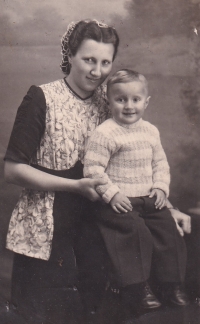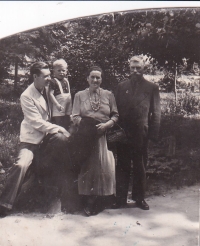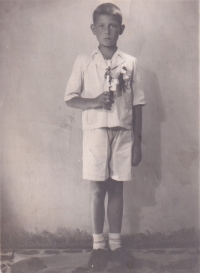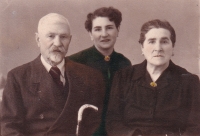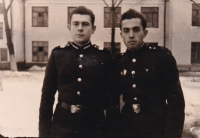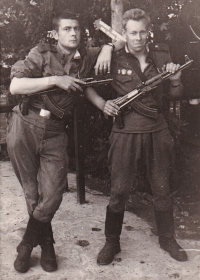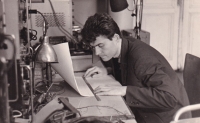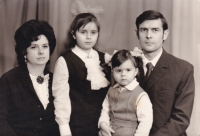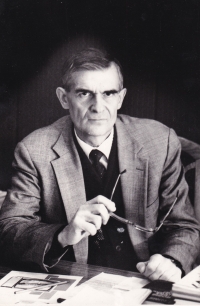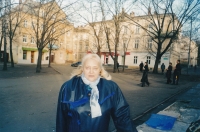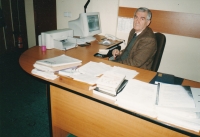A to [zhlédnutí filmu Exodus 1947] na mě udělalo takový dojem, protože se ukázalo, že jsem... v podstatě jsem měl problém s Brity. Jak to? Byli jste spojenci, bojovali jste proti Německu. Jak jste to mohli udělat Židům? A tak dále. Zaujalo mě to natolik, že jsem se rozhodl si o tom něco přečíst. Začal jsem číst různé knihy, ale o Židech jsem nevěděl vůbec nic. Kdo jsou Židé? Jaké jsou jejich zvyky? Náboženství? A tak dále. Začal jsem shánět knihy ke čtení, ale sovětští lidé měli jen šest dílů Šoloma Alejchema o Židech. A Šolom Alejchem popisoval hlavně život židovských umělců; zkrátka ze Šoloma Alejchema se dá jen málo pochopit, jak Židé žili, čím se zabývali a tak dále. Začal jsem v knihovnách hledat jiné knihy. Nikde nic nebylo. Pak mi řekli, že existuje židovský spolek, který má vlastní knihovnu, a ten se nachází v ulici Vuhilné a je tam synagoga, jmenuje se Jakub Glanzer Šul. Šel jsem tam a seděla tam Olja Fadějeva, která je teď vedoucí knihovny, i když teď se organizace přestěhovala do ulice Kotljarevského 30. Přišel jsem za ní. „Jste Žid?“ Říkám: „No, moje matka byla Židovka, takže mě židovská otázka velmi zajímá, prý máte knihy.“ — „Ano, knihy máme, všechny knihy jsou výhradně na židovské téma, nemáme Puškina, nemáme Lermontova, ale máme spoustu knih od židovských autorů.“ Říkám: „Tak mi nějakou dejte, přečtu si.“ — „To jako ne, kdybyste byl Žid, a jste Žid?“ — „Jsem Žid.“ — „Ne, máte nějaké dokumenty, že jste Žid? Rodný list.“ Říkám: „Ne.“ — „Tak vás nemůžeme zapsat do knihovny ani půjčit vám knihy.“ No, našel jsem si vlastní způsoby. Našel jsem si svou příbuznou Hanju Vujcyk. Moje babička Pavlina měla totiž mladšího bratra, ještě mladšího než ona, jmenoval se Jakub Lukanyč. Bydleli v Brodech v centru, kousek od trhu. Měli židovské sousedy, jejich příjmení bylo Grojss. Když Němci začali dávat Židy s kufry do kolony, aby je naložili do vlaku, který jel do Bełżce, do koncentráku, no, nebyl to koncentrák, ale lágr smrti. Tak jejich sousedka přivedla tu holku, tu Hanju, Hanu, k bratrovi mé babičky, ani nevím, jaký je to příbuzný, ale babička byla moje vlastní a byl to její vlastní bratr. A ta židovka řekla: „Vezměte si naše dítě, a až se vrátíme, tak si ho od vás vezmeme, my se vám odvděčíme a tak.“ Neměli čas si dlouho povídat, vzali dítě, ti odjeli — a bylo po všem. Dítě adoptovali, vystudovala institut Plechanova v Moskvě, je ekonomka. Byla to mimořádně inteligentní žena, vždyť byla Židovka. Pak dostala práci tady ve Lvově, vzala si Ukrajince příjmením Vujcyk a pak vyhledala své sestřenice, které přežily. Jedna byla v Izraeli, druhá v Americe. Ta v Izraeli jí řekla: „Ne, ne, ne, k nám nemůžeš, my tě nemůžeme přijmout, jsme chudí, tak chudí.“ A ta z Ameriky sem přijela sama. Zkrátka jsem objevil tu svou příbuznou — Hanju. Moc jsme se nevídali, ale čas od času jsme se někde potkávali. Takže jsem se na ni obrátil. Říkám: „Hele, jak se dostanu do té knihovny?“ A ona: „Jsem tam zaregistrovaná.“ Řikám: „No, ta paní, co tam sedí, mi nechce dát knihu.“ — „No, tak ti ji nedá, pojďme se setkat.“ Tak jsme se s ní sešli a šli spolu do té knihovny. Říká mi: „Co si chceš půjčit?“ A já jsem tehdy právě dostal doporučení na úplně první knihu, kterou si mám přečíst, abych se seznámil s židovským tématem, a to memoáry Goldy Meirové „My life“. Říkám: „Chci si půjčit Goldu Meirovou.“ Hanja říká Olji: „Napiš mi do kartičky Goldu Meirovou. No, a co si mám vzít ke čtení já?“ — „Co by sis vzala? Podle mě, tak je vedle Goldy Meirové Ben Gurion. Vezmi si tu o Ben Gurionovi a pak si to vyměníme.“ A tak jsem se zapsal do té knihovny, tedy Hanja si ty knihy pro mě vypůjčila.

